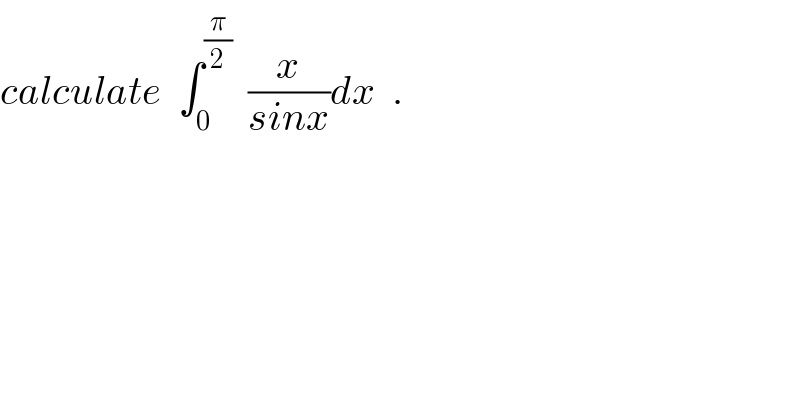
Question and Answers Forum
Question Number 40868 by math khazana by abdo last updated on 28/Jul/18

Commented by tanmay.chaudhury50@gmail.com last updated on 29/Jul/18

Commented by tanmay.chaudhury50@gmail.com last updated on 29/Jul/18

Commented by maxmathsup by imad last updated on 29/Jul/18

Commented by math khazana by abdo last updated on 30/Jul/18
![let I = ∫_(π/3) ^(π/2) (x/(sinx))dx changement tan((x/2))=t give I = ∫_(1/(√3)) ^1 ((2arctant)/((2t)/(1+t^2 ))) ((2dt)/(1+t^2 )) =2 ∫_(1/(√3)) ^1 ((arctant)/t) dt let introduce the parametric function f(x) = ∫_(1/(√3)) ^1 ((arctan(xt))/t)dt we have f^′ (x)= ∫_(1/(√3)) ^1 (t/(t(1+x^2 t^2 )))dt =∫_(1/(√3)) ^1 (dt/(1+x^2 t^2 )) =_(xt=u) ∫_(x/(√3)) ^x (1/(1+u^2 )) (du/x) =(1/x) ∫_(x/(√3)) ^x (du/(1+u^2 )) =(1/x)[arctan(u)]_(x/(√3)) ^x =(1/x){arctan(x)−arctan((x/(√3)))}⇒ f(x)= ∫_0 ^x ((arctan(t))/t)dt −∫_0 ^x ((arctan((t/(√3))))/t)dt +λ λ=f(0)=0 but ∫_0 ^x ((arctan((t/(√3))))/t)dt =_((t/(√3))=u) ∫_0 ^(x/(√3)) ((arctan(u))/(u(√3))) (√3)du =∫_0 ^(x/(√3)) ((arctan(t))/t)dt⇒ f(x)= ∫_0 ^x ((arctan(t))/t)dt−∫_0 ^(x/(√3)) ((arctan(t))/t)dt I =2f(1) =2{ ∫_0 ^1 ((arctant)/t)dt −∫_0 ^(1/(√3)) ((arctant)/t)dt} we have arctan^′ (t)=(1/(1+t^2 )) =Σ_(n=0) ^∞ (−1)^n t^(2n) ⇒ arctant = Σ_(n=0) ^∞ (((−1)^n )/(2n+1))t^(2n+1) ⇒ ((arctant)/t) =Σ_(n=0) ^∞ (((−1)^n )/(2n+1)) t^(2n) ⇒ ∫_0 ^1 ((arctant)/t)dt =Σ_(n=0) ^∞ (((−1)^n )/(2n+1))∫_0 ^1 t^(2n) dt =Σ_(n=0) ^∞ (((−1)^n )/((2n+1)^2 )) (sum knownby fourier serie) ∫_0 ^(1/(√3)) ((arctant)/t)dt =Σ_(n=0) ^∞ (((−1)^n )/((n+1+))[(1/(2n+1))t^(2n+1) ]_0 ^(1/(√3)) =Σ_(n=0) ^∞ (((−1)^n )/((2n+1)^2 )) ((1/(√3)))^(2n+1) ...](Q40976.png)
